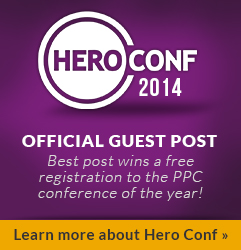When Less Has to Be More – Working with Limited Budgets

Editor’s Note: This article is a part of our Hero Conf guest post contest. Based on a combination of pageviews and editorial review from the PPC Hero writing staff, a winner will be chosen from the finalists we post throughout the week. Today’s post comes to us from Julie Friedman Bacchini (@NeptuneMoon), Founder and President of Neptune Moon.
 In a perfect world, we would all have infinite amounts of time, energy and money to throw at our PPC campaigns. But, since we live in the real world, and limited budgets are very much a reality, I’ve got a few ideas for getting the most from the dollars available.
In a perfect world, we would all have infinite amounts of time, energy and money to throw at our PPC campaigns. But, since we live in the real world, and limited budgets are very much a reality, I’ve got a few ideas for getting the most from the dollars available.
Of course, I am assuming that you’ve already done all the obvious stuff like scheduling ads to most active or effective hours, turned off low performing keywords, been ruthless with your negative keywords, etc. But after that stuff has been done, then what? Is there more you can do to squeeze just a few more conversions out of those campaigns without a budget increase?
Limited budgets can come in two forms, but the approach is the same whether limited from the start by a small daily cap or whether you start seeing the dreaded “Limited By Budget” warning in your campaigns.
On to the ideas…
Make Sure Your Campaigns Are Functioning the Way You Think They Are
Or, as I like to call it – keeping Google honest! Lately we have noticed that keywords don’t always do what you think they’re doing. Case in point, while reviewing keywords in several campaigns, about half of our “eligible” terms were not triggering ads (and this was not due to low search volume status – a topic for another post!).
Upon further investigation, it seemed that Google was deciding to use what they deemed a related term, even though the campaign was set up quite specifically with phrase, exact and a few modified broad match terms. Generally, the “related” term that was triggering ads had a lower quality score than the more specifically matched term that was not triggering ads. It is worth some time to mouse over the little Eligible bubble and see if all of your seemingly active keywords are actually triggering ads. Targeted ads and landing pages are kind of worthless if a specific term causes another less specific term to actually display. Try turning off one of the terms that are causing the confusion and monitor results. Then use the best converting option.
It is also worth noting that these statuses are quite shifty – after first noticing this we went back to dig deeper a few days later and the terms not triggering ads were partially different. This is something we will be investigating further and will definitely share our findings.
Take Geo Targeting to the Next Level
You probably spent some time in the beginning of your campaign strategy talking with the client about the appropriate geographic settings for their campaigns – great! But, if budgets are tight and you want maximum bang for those bucks, consider tinkering with the geographic settings to put the dollars where the most conversions are. Ideally, when taking this route you would have input from the client about where the most profitable sales or leads come from to form your priority list. This is not about turning off campaigns in lower performing areas, but more about upping the chances of your ads being seen by people who are more likely to buy or fill out that lead form.
We have used this technique with several of our accounts and the results have definitely been positive. Try either upping the geographic bid modifier for the areas you want to target more or lowering the modifier for the areas where you’re less likely to score a conversion. It is an experiment worth trying when dollars are limited. When you need to prioritize, putting the ads where they are more likely to succeed for more profitable results is a winning strategy!
Check Your Competition
You did a competitive PPC review when you started or took over this campaign, right? The answer should absolutely be yes to that question, by the way! When funds are limited, particularly when the “Limited By Budget” warning is new, checking out what the competition is doing is also a great use of time. Are there opportunities for your campaign to differentiate from the competition in new ways? Has the competition’s level of sophistication in PPC changed significantly? If so, make sure you’re still standing out.
Testing ad and landing page copy often is a solid PPC best practice. Often times though, once a campaign has been setup that testing is against yourself – beating your best performing ad, tweaking your lead generation form fields, etc. From time to time it is important to make sure you understand where your campaign is relative to the other choices a searcher is likely to see. We recommend incorporating this practice into your management of all campaigns on a quarterly basis. The landscape can shift significantly in a very short period of time. You don’t want your client to be the one to point out that their biggest competitor is suddenly everywhere and ahead of them in PPC.
How do you handle limited budget scenarios? Always love to hear how others tackle PPC challenges!



